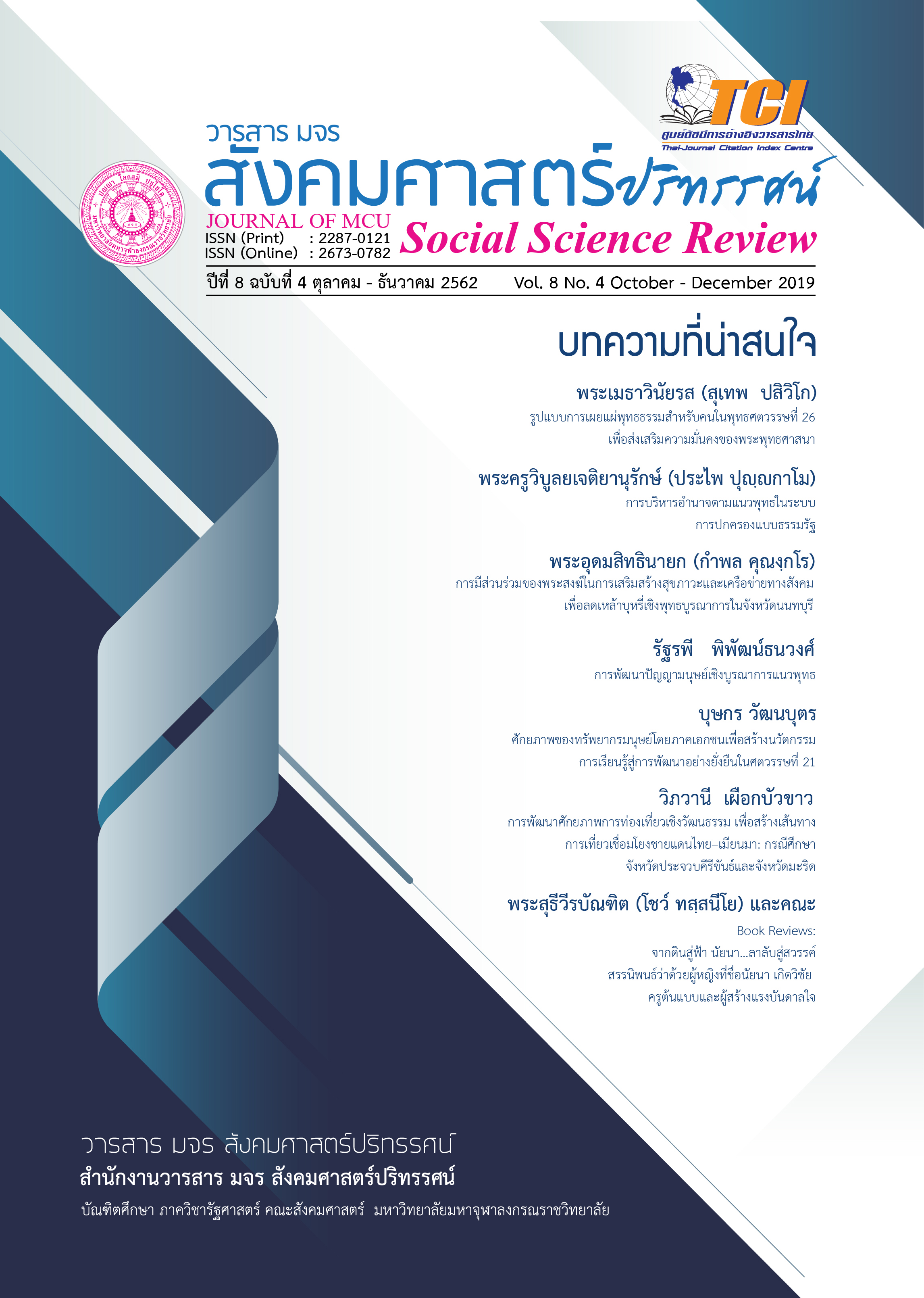การพัฒนาชุมชนวิถีประชาธิปไตยตามหลักธรรมาภิบาล: หลักความโปร่งใส ของประชาชนในพื้นที่เขตดุสิต กรุงเทพมหานคร
คำสำคัญ:
การมีส่วนร่วมของประชาชน, วิถีประชาธิปไตย, หลักความโปร่งใส, ชุมชนเมืองบทคัดย่อ
การวิจัยในครั้งนี้กำหนดวัตถุประสงค์เพื่อวิเคราะห์การมีส่วนร่วมในกิจกรรมการพัฒนาพื้นที่ กิจกรรมทางการเมือง วิถีประชาธิปไตยแบบไทยและการศึกษาทัศนคติของประชาชนในการดําเนินงานของหน่วยงานรัฐและภาคประชาชนตามหลักธรรมาภิบาล: ความโปร่งใสในชุมชนเพื่อการพัฒนาวิถีประชาธิปไตย โดยทำการเก็บข้อมูลจากประชาชนใน 46 ชุมชน จำนวน 400 กลุ่มตัวอย่างในเขตดุสิต กรุงเทพมหานคร และอาศัยอยู่นอกชุมชน จำนวน 60 กลุ่มตัวอย่าง รวมทั้งสิ้นกลุ่มตัวอย่างในการวิเคราะห์ 460 คน รวมถึงทำการสัมภาษณ์ผู้นำชุมชน จำนวน 46 คน พบผลการวิจัยว่า การมีส่วนร่วมของประชาชนในกิจกรรมพัฒนาเชิงพื้นที่และกิจกรรมส่วนรวมของหน่วยงานรัฐที่จัดให้กับประชาชนโดยภาพรวมอยู่ในระดับปานกลางส่วนด้านการวิเคราะห์วางแผนในการพัฒนาพื้นที่ประชาชนมีส่วนร่วมน้อยที่สุด ในประเด็นการมีส่วนร่วมในกิจกรรมทางการเมืองในช่วย 5 ปีที่ผ่านมาประชาชนคิดว่าตนเองมีสิทธิเสรีภาพในการดำรงชีวิตประจำวันอย่างเต็มเปี่ยม แต่ขาดการมีสิทธิเสรีภาพในการรวมกลุ่มกันซึ่งมีการจัดกิจกรรมรวมกลุ่มจะมีทหารและเจ้าหน้ารัฐเข้ามาเฝ้าสังเกตการณ์ร่วมด้วยเสมอ ทั้งนี้ประชาชนมีทัศนคติต่อกิจกรรมทางการเมืองและวิถีทางการเมืองการปกครองประชาธิปไตยแบบไทยอย่างชัดเจนในมิติความจริงที่ว่าประชาชนให้ความสำคัญกับการมีความเชื่อมั่น และชื่นชมในระบอบการปกครองที่มีสถาบันพระมหากษัตริย์เป็นสถาบันสูงสุดที่จะสามารถแก้ปัญหาของชาติให้มั่นคงยั่งยืน และมีความเหมาะสมต่อการปกครองในประเทศไทย อยู่ในระดับจริงหรือระดับมากที่มีค่าเฉลี่ยสูงสุด รองลงมามีความคิดเห็นว่า การช่วยเหลือเกื้อกูลกันหรือระบบอุปถัมภ์นั้นยังเป็นพฤติกรรมที่ปฏิบัติกันอยู่ในสังคมไทย อยู่ในระดับจริงเช่นเดียวกัน พร้อมกันนั้นประชาชนเชื่อมั่นในหลักธรรมาภิบาลด้านความโปร่งใสที่สุดในเรื่องที่ว่าเมื่อมีกิจกรรมที่ขอความร่วมมือจากองค์กรภาคเอกชน หรือภาครัฐ วิชาการจากภายนอก ผู้นำและคณะกรรมการชุมชนได้มีการประกาศเปิดเผยข้อมูลให้ประชาชนได้รับรู้และเปิดโอกาสให้เข้าร่วมอย่างทั่วถึงกันในชุมชน ส่วนปัจจัยที่มีผลต่อวิถีประชาธิปไตย ได้แก่ เพศ รายได้ต่อเดือน และการเป็นสมาชิกกลุ่มทางสังคม
เอกสารอ้างอิง
Arithat Kaewkosaba. (2017). Good Governance Principles in The Constitution of The Kingdom of Thailand B.E. 2560. Academic Article Hot Issue Of the Secretariat of The House of Representatives, July 2017, pp. 1-5.
Cohen, J. & Uphoff, N. (1980). Participation's place in rural development: Seeking clarity through specificity. World Development, (8), pp. 213-235.
Department of Local Administration Ministry of the Interior. (2012). A Guide to Good Corporate Governance Principles of the local government organization. Bangkok: Agricultural Cooperative Community of Thailand.
Moral and transparency assessment center of government agencies (2018). Integrity and Transparency Assessment (ITA). Bangkok: Office of the National Counter Corruption Commission.
Nattarin Chaloemritthiwat. (2016). Local Political Participation Among Women in Chum Saeng Municipality, Amphoe Wang Chan, Rayong Province. Major: Public and Private Management; M.P.A. (Public and Private Management) Burapha University.
Office of Political Development Council King Prajadhipok's Institute. (2011). Citizenship Research Report: Academic Document No. 54-01. Bangkok: The Council of Ministers and the Government Gazette.
Office of the National Economic and Social Development Board. (2011). His Majesty the King's work on national development of the King. Bangkok: Phet Rung Printing Center.
Office of the Public Sector Development Commission. (2009). A Guide to Organizational Governance Level In accordance with the principles of good governance rating. Bangkok: Premier Pro.
Orathai Pratad.(2015). Participation of Citizens in Community Development in Fort Mahakan, Rattanakosin Island,Thailand. an Independent Study Submitted in Partial Fulfillment of The Requirements for The Degree of Master of Political Science (Public Affairs) Executive Program in Public Affairs Faculty of Political Science Thammasat University.
Pannilai Nitirochana. (2014). People Participation in Community Development of Bangkok Metropolitan: Case Study; Wangthonglang District’s Self-Reliance Community Plan. Master of Arts (Law and Management) National Institute of Development Administration (NIDA).
Phusit Phukamchanoad. (2009). The Participation of Community Committee in Sub-community Development in Dusit District, Bangkok. Suan Sunandha Rajabhat University.
Phusit Phukamchanoad. (2010). A Political Participation Model of the people in Dusit District, Bangkok. Suan Sunandha Rajabhat University.
Phusit Phukamchanoad. (2018). Citizen Participation in Community Development Management for the Social Inequality Mitigation in the Three Poor Cities from the Northern Zone Based on the Sufficiency Economy Philosophy. Suan Sunandha Rajabhat University.
Pichai Rattanadilok Na Phuket. (1998). Classes and elections. Bangkok: Wiphasa.
Royal Thai Government Gazette. (2007). The Constitution of the Kingdom of Thailand. available: http://www.ratchakitcha.soc.go.th/DATA/PDF/2550/A/047/1.PDF [November 13, 2016]
Sombat Thamrongthanyawong (2006). Thai politics. Bangkok: Sema Dharma.
Thanawith Kangkang. (2003). The Participation of the Community Committee in Developing the Municipal Community in Tambon Samrong Tai, Amphoe Phra Pradaeng, Samut Prakan. Dhonburi Rajabhat University. Office of Academic Resources and Information Technology.
Yamane, Taro. (1973). Statistics: An Introductory Analysis. 3rd ed., Tokyo: Harper.
ดาวน์โหลด
เผยแพร่แล้ว
รูปแบบการอ้างอิง
ฉบับ
ประเภทบทความ
สัญญาอนุญาต
ลิขสิทธิ์ (c) 2019 วารสาร มจร สังคมศาสตร์ปริทรรศน์

อนุญาตภายใต้เงื่อนไข Creative Commons Attribution-NonCommercial-NoDerivatives 4.0 International License.
เพื่อให้เป็นไปตามกฎหมายลิขสิทธิ์ ผู้นิพนธ์ทุกท่านต้องลงลายมือชื่อในแบบฟอร์มใบมอบลิขสิทธิ์บทความให้แก่วารสารฯ พร้อมกับบทความต้นฉบับที่ได้แก้ไขครั้งสุดท้าย นอกจากนี้ ผู้นิพนธ์ทุกท่านต้องยืนยันว่าบทความต้นฉบับที่ส่งมาตีพิมพ์นั้น ได้ส่งมาตีพิมพ์เฉพาะในวารสาร มจร สังคมศาสตร์ปริทรรศน์ เพียงแห่งเดียวเท่านั้น หากมีการใช้ภาพหรือตารางหรือเนื้อหาอื่นๆ ของผู้นิพนธ์อื่นที่ปรากฏในสิ่งตีพิมพ์อื่นมาแล้ว ผู้นิพนธ์ต้องขออนุญาตเจ้าของลิขสิทธิ์ก่อน พร้อมทั้งแสดงหนังสือที่ได้รับการยินยอมต่อบรรณาธิการ ก่อนที่บทความจะได้รับการตีพิมพ์ หากไม่เป็นไปตามข้อกำหนดเบื้องต้น ทางวารสารจะถอดบทความของท่านออกโดยไม่มีข้อยกเว้นใดๆ ทั้งสิ้น





